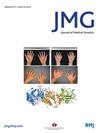导致 DMD 基因保守位点剪接供体缺失的新型突变会导致杜氏肌营养不良症和隐睾症
IF 3.5
2区 医学
Q2 GENETICS & HEREDITY
引用次数: 0
摘要
背景隐睾症是男婴中最常见的先天性畸形之一,根据以往对常见变体的研究发现,隐睾症的病因是多基因遗传。然而,由于罕见变异比常见变异对疾病的有效影响更大,人们对罕见变异导致隐睾症的遗传倾向知之甚少。方法 本研究使用全基因组测序技术分析了115名中国隐睾症患者,以及19名父母对照组和2136名未受影响的男性。此外,还在小鼠模型中对保守变异体进行了 CRISPR-Cas9 编辑,并通过核磁共振成像筛查来观察表型。结果 在 115 例患者中的 30 例(26.1%)中,我们发现了 4 个新基因(ARSH、DMD、MAGEA4 和 SHROOM2)至少影响 5 例非亲属患者,4 个已知基因(USP9Y、UBA1、BCORL1 和 KDM6A)的候选罕见致病变体至少影响 2 例患者。罕见变异的负担测试表明,新发现的基因(pG)在全基因组范围内具有重要意义,该基因位于脊椎动物的一个保守位点,复制了双侧隐睾症表型,并在 4 周和 10 周时通过核磁共振成像得到证实。运动测试进一步揭示了转基因小鼠的杜氏肌营养不良症(DMD)症状。结论 我们的研究结果揭示了 DMD 基因突变在导致隐睾症中的作用。研究结果还表明,致病缺陷的母系X遗传在隐睾症的发病中可能起主要作用。与该研究相关的所有数据均包含在文章中或作为补充信息上传。本文章由计算机程序翻译,如有差异,请以英文原文为准。
Novel mutation leading to splice donor loss in a conserved site of DMD gene causes Duchenne muscular dystrophy with cryptorchidism
Background As one of the most common congenital abnormalities in male births, cryptorchidism has been found to have a polygenic aetiology according to previous studies of common variants. However, little is known about genetic predisposition of rare variants for cryptorchidism, since rare variants have larger effective size on diseases than common variants. Methods In this study, a cohort of 115 Chinese probands with cryptorchidism was analysed using whole-genome sequencing, alongside 19 parental controls and 2136 unaffected men. Additionally, CRISPR-Cas9 editing of a conserved variant was performed in a mouse model, with MRI screening used to observe the phenotype. Results In 30 of 115 patients (26.1%), we identified four novel genes ( ARSH , DMD , MAGEA4 and SHROOM2 ) affecting at least five unrelated patients and four known genes ( USP9Y , UBA1 , BCORL1 and KDM6A ) with the candidate rare pathogenic variants affecting at least two cases. Burden tests of rare variants revealed the genome-wide significances for newly identified genes (p<2.5×10−6) under the Bonferroni correction. Surprisingly, novel and known genes were mainly found on X chromosome (seven on X and one on Y) and all rare X-chromosomal segregating variants exhibited a maternal inheritance rather than de novo origin. CRISPR-Cas9 mouse modelling of a splice donor loss variant in DMD (NC_000023.11:g.32454661C>G), which resides in a conserved site across vertebrates, replicated bilateral cryptorchidism phenotypes, confirmed by MRI at 4 and 10 weeks. The movement tests further revealed symptoms of Duchenne muscular dystrophy (DMD) in transgenic mice. Conclusion Our results revealed the role of the DMD gene mutation in causing cryptorchidism. The results also suggest that maternal-X inheritance of pathogenic defects could have a predominant role in the development of cryptorchidism. All data relevant to the study are included in the article or uploaded as supplementary information.
求助全文
通过发布文献求助,成功后即可免费获取论文全文。
去求助
来源期刊

Journal of Medical Genetics
医学-遗传学
CiteScore
7.60
自引率
2.50%
发文量
92
审稿时长
4-8 weeks
期刊介绍:
Journal of Medical Genetics is a leading international peer-reviewed journal covering original research in human genetics, including reviews of and opinion on the latest developments. Articles cover the molecular basis of human disease including germline cancer genetics, clinical manifestations of genetic disorders, applications of molecular genetics to medical practice and the systematic evaluation of such applications worldwide.
 求助内容:
求助内容: 应助结果提醒方式:
应助结果提醒方式:


